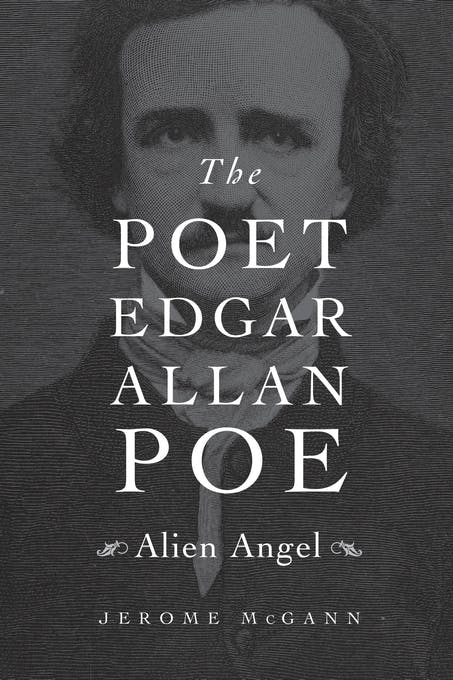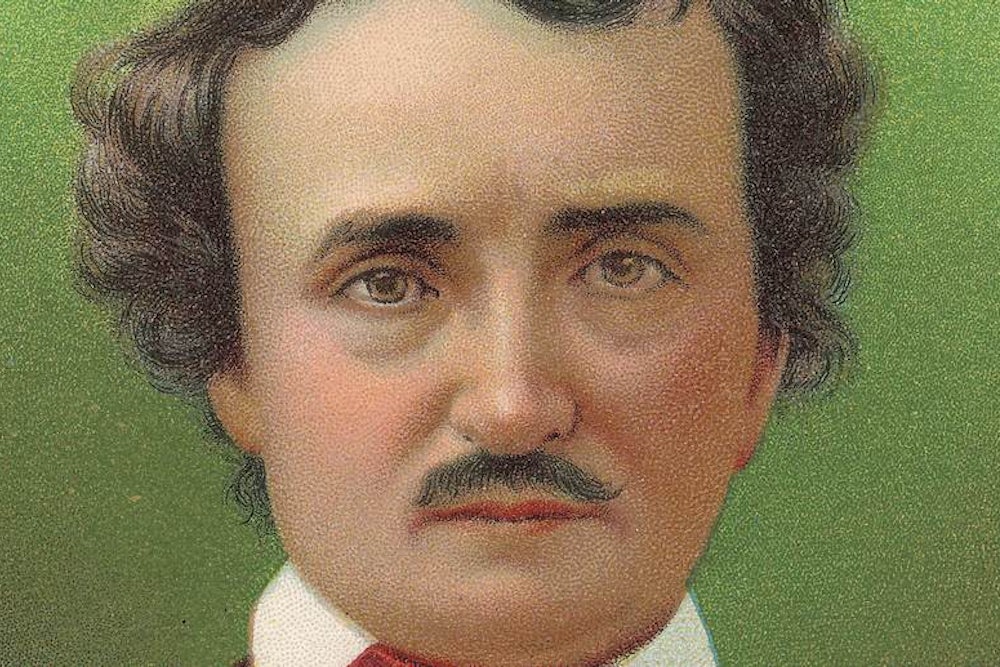It’s hard to think of another American writer as easefully and ubiquitously caricatured as Edgar Allan Poe. There’s Hemingway, of course, furry-chested with a rifle in one hand, a bottle in the other, some massacred beast at his feet and a phalanx of wives behind him. And there’s the Hal Holbrook version of Twain, all white suit and copse of white hair, cigar like a microphone.
But Edgar Poe is different. Famous enough in his day to be poked at on the street by sadistic children screeching “Nevermore,” Poe, since his death in 1849, has never been absent from either the whispers of intrigue or the lustful gaze of pop culture. Among non-specialists what American poem is better known than “The Raven”? How many American writers have a face—oh that doughy face, lopsided in disappointment, mangled by grief—capable of being recognized by many an average high schooler? Whose mustachio is more famous? (Maybe Dalí’s, perhaps Tom Selleck’s.) Lonesome, tortured, cartoonish Poe. His life and legacy are myth, his early death at forty a mystery our best Auguste Dupins can’t solve to satisfaction.

We tend to nurse this caricature, the original teller of tales from the crypt, our dark darling of psycho-emotional suspense, our depressed anti-Emerson for whom it's always Halloween. In doing so we overlook the locomotive mind, the discerning and draconian literary judgments, the aesthetic/poetic program that garnered the esteem of Whitman, Baudelaire, Mallarmé, Valéry, William Carlos Williams, and T.S. Eliot, among immortal others (although, true, Whitman and Eliot ran both hot and cold when it came to Poe). Poe’s unmistakable stories remain in good health—for what they do, none do it better; entire swaths of H.P. Lovecraft and Conan Doyle seem unlikely without them—but the poetry, well: the poetry presents a bit of a problem.
It’s no wonder Poe’s poems are popular among high school teachers: they’re singsong catchy. Emerson, irked by Poe’s lack of moral gravity, called him “the Jingle Man.” And in their obscurantist ways—“ungraspable” was Updike’s word—the poems beg to mean whatever the hell you want them to mean. For this reason and an onslaught of others, Harold Bloom averred that Poe’s poems “scarcely bear reading.” Even in his admiration, Jerome McGann, author of the new study The Poet Edgar Allan Poe: Alien Angel, admits that Poe’s poetry “is at once unremittingly vulgar and theoretically advanced, even pretentious,” and you have my sympathies if the vulgar/advanced/pretentious cocktail is not the cocktail you yearn for.
McGann has set out to address and correct the problem of Poe’s poetry, and the result is a necessary volume not only for those compelled and beguiled by Poe but for anyone who understands the importance of poetic tradition and its umbilical to American imagination. This book is McGann’s deep-seeing riposte to those critics—Emerson, Yvor Winters, D.H. Lawrence, Harold Bloom, et al.—who have dismissed Poe’s aesthetics as by turns decadent and preposterous. The problem, “the serious scandal of the poetry,” as McGann puts it, is precisely that the poetry has been vilified or repelled by the American sentries of poetic reputation—those critics and scholars both within and without the academy—even while lauded across Europe and in France especially. You probably haven’t heard or read a Poe poem since high school, and you probably weren’t touched or enriched or enlarged by it because you were too busy scratching your head. “At the heart of these problems,” writes McGann, “is the modernity of Poe’s severe aesthetic formalism ... Poetry in his view should not be approached as a repository for ideas or expression of feelings but as an event of language.”
Poe was on to something there, or a shred of something. Poetry that behaves as only a staging ground for ideas amounts to little more than the agitprop of an ideologue. Poetry that is a deluge of all your precious emotions ends up as doggerel, an undisciplined sortie into sentimentality. (R. P. Blackmur, demolishing D. H. Lawrence, dubbed this “the fallacy of expressive form”: feel all your feelings intensely enough and the poem’s architecture will take care of itself—it never does.)
But poetry that vanquishes ideas and emotions altogether to practice the dance and dazzle of language ends up looking like Poe’s “Ulalume—A Ballad,” the first two stanzas of which are:
The skies they were ashen and sober;
The leaves they were crispéd and sere—
The leaves they were withering and sere;
It was night in the lonesome October
Of my most immemorial year;
It was hard by the dim lake of Auber,
In the misty mid region of Weir—
It was down by the dank tarn of Auber,
In the ghoul-haunted woodland of Weir.
Here once, through an alley Titanic,
Of cypress, I roamed with my Soul—
Of cypress, with Psyche, my Soul.
There were days when my heart was volcanic
As the scoriae rivers that roll—
As the lavas that restlessly roll
Their sulphurous currents down Yaanek
In the ultimate climes of the pole—
That groan as they roll down Mount Yaanek
In the realms of the Boreal pole.
Technically proficient, pretty in its alliterative and mildly confessional way—Poe thought “Beauty,” with his hollering upper case, the sole aim of poetry—but it doesn’t say very much about anything at all, and it goes on like that for eight stanzas more. About Poe’s verse, McGann rightly states: “The writing itself is not expressive, it is composed.” A gelid word there, composed. When Evelyn Waugh said, “I regard writing not as an investigation of character but as an exercise in the use of language,” he meant of course that character—and plot and meaning—results from whatever style the narrative demands. Poe labored for a similar cause and effect in his verse—he wanted “the pure elevation of soul” to be made manifest by “Beauty”—but it didn’t quite work out that way.
McGann speaks of Eliot’s “lifelong struggle” to comprehend by what abracadabra Poe’s verse could be painfully “slipshod” and “puerile,” while his aesthetic program was central to the accomplishments of Baudelaire and Mallarmé and Valéry. One obvious answer is that a writer can be a potent, innovative poetical theorist and explicator while at the same time a middling, maudlin poet. Poe’s extensive, meticulous theories of composition were among the first of their kind. Daniel Hoffman—in his dynamic and disobedient masterwork Poe Poe Poe Poe Poe Poe Poe (that’s seven times, I know)—remarks that not till Pound “did anyone attend with such clarity and precision to the craft of verse.” Poe’s breaking from the Romantic, Shelleyan credo of composition must have seemed like a thrilling sally in a new clime, and this was especially welcome in the French literary orbits of the late nineteenth century, where writers and thinkers had begun to distrust the methods of the English Romantic bards.
“The subject of Poe’s poetry,” writes McGann, “is always finally the idea of poetry itself,” and in this Poe was an accidental precursor of all that late twentieth-century American verse, penned by tweedy professors of creative writing in between conferences—poems that yawningly celebrated their own workshopped construction while being content to speak only to other poems penned by tweedy professors. Much American poetry had become a saturnalia of tenured incest, but let’s not indict Poe for that.
We can indict him, however, for composing poems the way a mathematician attacks algebraic equations. The metaphor is Poe’s own: imagination, he said, should have “the precision and rigid consequence of a mathematical problem,” which is rather like storyboarding your coitus before you begin. That poets undertake their work by rational blueprints is, says Hoffman, “a convenient fiction.” “The man,” wrote Hoffman of Poe, “is a daimonic master-mechanic of his watchmaker world,” and there’s an insult tucked away in there. We demand of our poets, Romantic or not, more than watchmaking—more sublime messiness, more anarchic personality, more moral substance, more matter, than Poe was willing to allow, which is why his verse sounds so bloodless next to Whitman's, so inconsequential next to Dickinson's, and so mechanical next to almost anyone else's. Style for Poe was the almost negligible outcome of over-rationalized composition, and not the organic outcrop of substance. (For a hammered-home contrast, look again at any one of the sonnets of Gerard Manley Hopkins to see how the singing and the song are one.)
In seeking to break from the Romantic credo of creation, in his hellbent emphasis on the cogitation of composition, on imagination as a consequence wholly of rationality, Poe ruined whatever chance he had of sharing the throne with Whitman and Dickinson atop the Parnassus of American Poetry. Regardless, McGann gently suggests that Poe belongs at that apex beside our two national treasures, and this will reach some ears as blasphemy and others as chicanery. But part of the large pleasure of McGann’s book is his contra-academic gift of phrase, his parsed insights into Poe’s “legend-laden life” and the “angel of the odd” suspended over his writing desk. Poe “invites us to join that revisionary company of the less deceived, who live on living in the cold clarity of their undeceptions,” and that’s one of the truest lines you’ll ever read about the maker of “The Gold-Bug” and “The Murders in the Rue Morgue.”
Edgar Poe is our cherished purveyor of phantasm, our unholy maestro of the macabre. His storytelling glycogen spent itself too rapidly for him ever to summon the stamina needed for a novel, but it's compelling to consider what caliber of novelist he would have made—surely more technically astute than Lovecraft, perhaps less spiritually stabbing than Kafka. And yet one might as well consider what caliber of novelist Freud or Jung would have made. Judging from his novella The Narrative of Arthur Gordon Pym, it's clear that Poe would have remained the consummate storyteller even as the story was telling him to stop, the dauntless mythmaker even as the myth was making him sick.
Lawrence, with his typically Lawrentian gusto, asserted that Poe didn’t write about vampires as much as he was himself a vampire, and you take Lawrence’s meaning. You take it because that’s what you most love about Edgar Poe: his creepiness, his otherness, his charismatic diabolism. “Poe was and is our hysteria,” said Bloom, and we can’t, we won’t do without his paradoxically sundering and sating depictions of the hysterical and demonic that forever stretch their dark wings within us.
